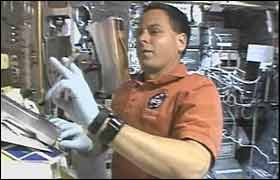Aside from the repeated declarations of the heads of NASA about their commitment to safety, the agency began to try and share the blame with other bodies, including the administration and Congress, which do not take care of an adequate budget
 NASA said in the evening (Tuesday) that tiles from the shuttle were found scattered in the states of California and Arizona. These are probably the first parts that fell off the shuttle. NASA hopes that finding these parts will help them in their investigation.
NASA said in the evening (Tuesday) that tiles from the shuttle were found scattered in the states of California and Arizona. These are probably the first parts that fell off the shuttle. NASA hopes that finding these parts will help them in their investigation.
Bill Reedy, director of NASA's space programs, entered the daily press conference in Washington yesterday, when he was well aware that the status of his agency had deteriorated greatly in recent days. In order to advance the review, Reedy, already at the beginning of his remarks, wanted to make it clear that the issue that is and has always been at the top of NASA's list of priorities is the safety of the flight, the astronauts and the people on the ground. He even went to the trouble of detailing at length all the steps taken by the director of NASA, Sean O'Keefe, in this area after taking office.
However, statements such as these by Reedy sound less convincing today, especially in light of the information that suddenly emerged from all sides about negligence, neglect of safety issues and a policy of removing anyone who dares to criticize from within the organization.
Along with the repeated declarations of the heads of NASA about their commitment to safety, the agency began to try and share the blame with other bodies as well, led by the administration and Congress which do not take care of an adequate budget. Completely by chance, yesterday the administration submitted its budget proposal for 2004. Despite an addition of 470 million dollars, NASA says that the new budget also continues the policy of eroding the economic power of the American space agency. Since the beginning of the 90s, NASA has lost about a quarter of its government funding. In 1990 its budget was 12.4 billion dollars, while in 2002 the budget reached 14.5 billion. Adjusted for inflation, the budget was supposed to increase to $20.3 billion just to maintain the agency's existing funding level.
And when there is no budget, there are also cuts. The American space agency emphasized that it spared nothing in the area of safety, but also noted that in light of the budgetary circumstances, quite a few veteran employees left the agency. In an organization, where a significant part of its ability is based on the experience of the technical staff, personnel turnover is not good news. When the veterans, who have accompanied the space shuttles since their first day and know every part, every procedure and every possible malfunction, leave and go to the private sector, they are replaced by young experts, who are equipped with all the necessary formal knowledge, but not the accumulated experience from practical work in the space programs. Such a turnover must have an impact on flight safety. Even the de facto privatization that NASA went through in the last decade, when it outsourced most of its work to external contractors, did not help to increase the supervision of the central management in all safety matters.
But NASA's message these days is mixed - on the one hand, the agency is trying to make it clear that decisions made in Washington regarding the budget have made it difficult to operate in the last decade, but on the other hand, the heads of NASA make it clear that even in the age of cuts, they did not skimp on safety matters - "safety It was always a central concern for us and was never related to budget considerations," Bill Reedy said yesterday in Washington.
It is possible that the latest disaster will lead to an additional infusion of funds to the American space agency, but in the long run it symbolizes additional difficulties for NASA. The American public and the government following it, are in a continuous process of losing interest in the space process. When you add to this consideration the concern creeping into the hearts of the public that NASA is not being careful enough about safety procedures, it is clear that in the coming years it will be even more difficult for the space agency to mobilize public support and budgets from Washington.
The director of NASA, Sean O'Keefe, who met with President Bush yesterday, will have to prove to the public in the coming weeks and months that his organization did everything to prevent a disaster. Any revelation of negligence, cover-up or cover-up will only bring the end of the American space program closer.
